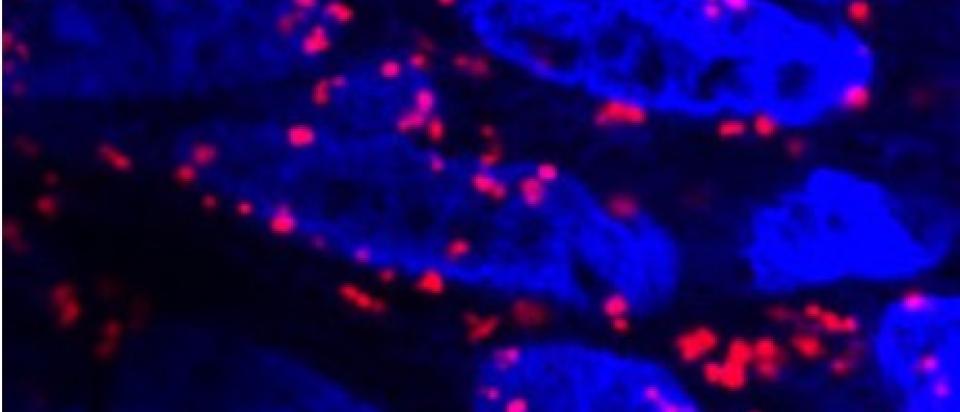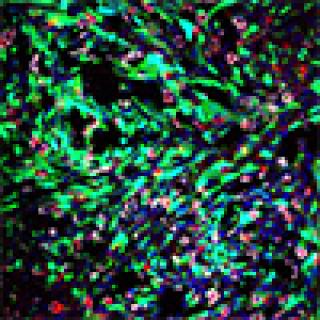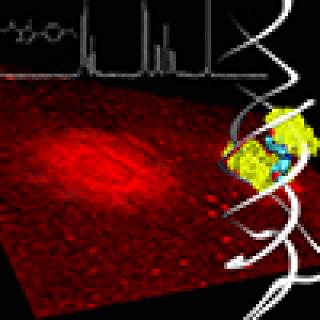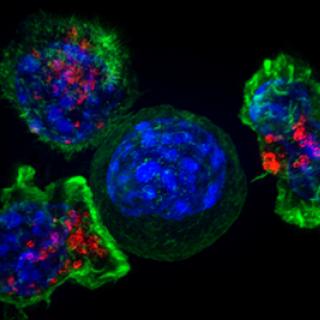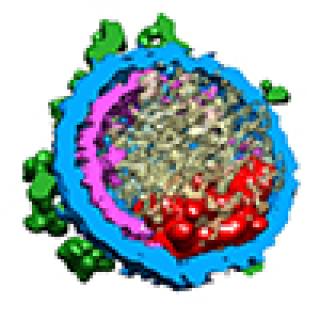News and Events
Mutant RAS can shift other proteins’ positions inside cancer cells
Mutant RAS proteins help shuttle other proteins out of the cell nucleus and into the cytoplasm, where some can promote cancerous growth.
Read MoreNew map of protein interactions hints at the underlying mechanisms of hereditary kidney cancer
A hereditary form of kidney cancer is characterized by high levels of the metabolite fumarate but how the compound fuels cancer remains a mystery. CCR researchers have mapped the proteins that fumarate interacts with, revealing new links between metabolism and malignancy.
Read MoreNew insights into mechanisms key to maintaining KRAS-mutant cancer cell survival
CCR researchers tested nearly 500 different combinations of multi-gene targeting strategies to study the mechanisms that favor the survival of KRAS-mutant colorectal and pancreatic cancer cells over normal cells. This study reveals the previously underappreciated complexity of the signaling network of the KRAS oncogene. Although work remains to be done, the research does suggest potential target combinations for more effective therapeutic interventions.
Read MoreClinical trial studies antitumor effect of sunitinib in central nervous system sarcomas
A new clinical trial is testing a cancer drug, sunitinib, on recurrent gliosarcoma and previously treated sarcomas of the central nervous system. This drug has been studied in several other types of cancer, where it was able to inhibit factors that help tumors grow and spread. Investigators want to see if sunitinib can have the same antitumor effect on sarcomas and gliosarcoma of the brain and spinal cord.
Read MoreEric Freed elected fellow of the American Academy of Microbiology
Eric Freed, Ph.D., Director of the HIV Dynamics and Replication Program, has been elected as a 2019 fellow of the American Academy of Microbiology, an honorific leadership group with the American Society for Microbiology. Fellows are elected annually through a highly selective, peer-review process based on their records of scientific achievement and original contributions that have advanced microbiology.
Read MoreTwo new compounds target a cancer-promoting RNA transcript
MALAT1 is a noncoding RNA associated with aggressive lung cancer and poor survival for patients with various tumor types. The identification of two new molecules that disable this RNA hints at new therapeutic avenues.
Read MoreClinical trial finds combination therapy effective for some biliary cancer patients
Completion of a phase I/II clinical trial found that two of 20 patients with biliary tract cancer disease experienced a partial response to treatment with the immune checkpoint inhibitor tremelimumab combined with microwave ablation therapy. Further studies are needed to understand why just a few patients responded well to this combination treatment.
Read MoreNew imaging technology to detect early-stage hereditary diffuse gastric cancer tested in clinical trial
Hereditary diffuse gastric cancer is a rare inherited condition caused by a mutation in the CDH1 gene. People who carry this genetic mutation are urged to have a screening endoscopy followed by surgery to remove the stomach. However, some patients elect to have regular endoscopic screenings to look for cancer. A new clinical trial is testing an imaging technology called confocal endoscopic microscopy (CEM) that may better detect cells in patients with the CDH1 mutation and potentially make a diagnosis during the endoscopy itself.
Read MoreSecond-generation maturation inhibitors show promise for HIV treatment
CCR researchers have improved upon bevirimat, a first-generation maturation inhibitor developed to treat HIV-1, the primary cause of AIDS. After pinpointing HIV-1 strains not effectively blocked by bevirimat during clinical trials, researchers developed second-generation inhibitors based on knowledge about the sequences of those resistant strains. The new inhibitors turned out to be more potent and active than bevirimat.
Read MoreRegistration now open for Chromatin and Cell Fate Decisions in Development, Aging & Cancer
The Chromatin and Cell Fate Decisions in Development, Aging & Cancer symposium, hosted by the Center of Excellence in Chromosome Biology (CECB), offers an opportunity to learn more about the current status of chromosome structure and function in development and disease, share research and discuss the use and implications of these advances for clinical applications. The mission of CECB is to achieve a comprehensive understanding of the mechanisms involved in chromosome function, how aberrations in chromosomes and chromatin lead to disease and how these defects can be corrected. Towards achieving our mission, this symposium brings together scientists in the fields of chromatin and chromosome biology, with the focus on stem cells, cell development, aging and cancer. Registration deadline is October 31, 2019.
Read MoreSteve Rosenberg receives 2019 Nathan Davis Award and Steinman Award
Steve Rosenberg, M.D., Ph.D., Chief of the Surgery Branch, has received the American Medical Association’s 2019 Dr. Nathan Davis Award for Outstanding Government Service and The American Association of Immunologists’ 2019 Steinman Award for Human Immunology Research. The Nathan Davis Award recognizes individuals who promoted the art and science of medicine via government service and demonstrated outstanding leadership in his/her field. The Steinman Award recognizes an individual who has made significant contributions to the understanding of immune processes underlying human disease pathogenesis, prevention or therapy.
Read More